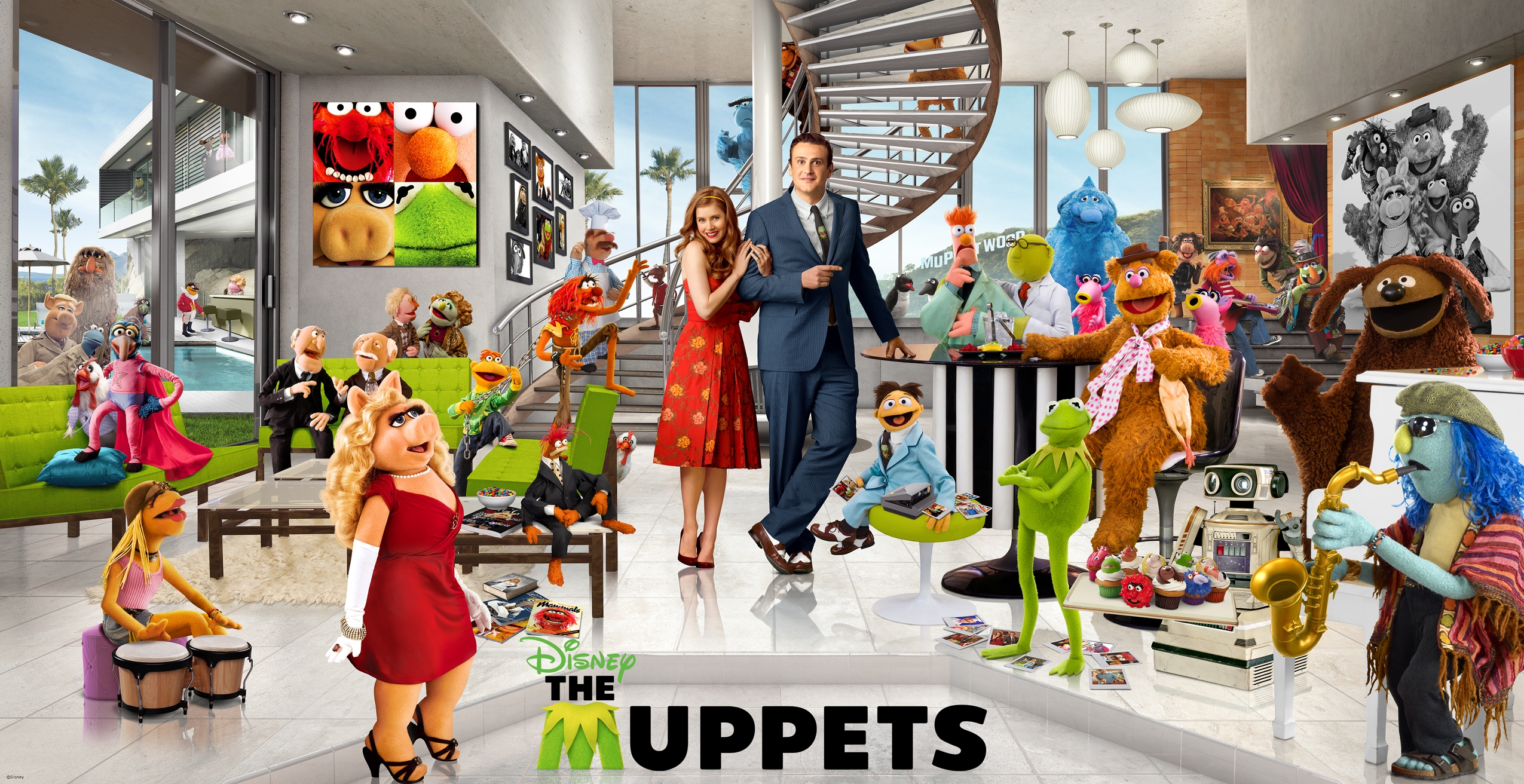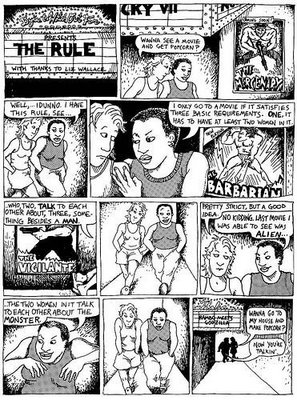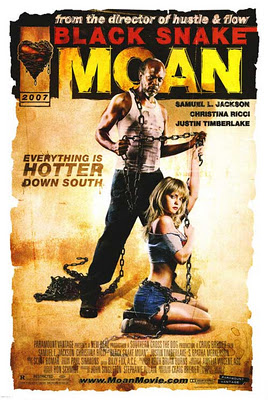I went to the doctor, and she tried to convince me I’m only developing allergies, but I told her I don’t understand how allergies can make my entire face, head, neck, and body feel like they might simultaneously explode, but you know, what do I know. So I’m slacking off today while I get my “allergy” situation in check. This is what was happening three Novembers ago, when Bitch Flicks had only three readers: my sister, Amber’s husband, and … wait, maybe we only had two readers …
Whatever, it’s a flashback to our very first Review in Conversation. We’ve since gone on to publish RiCs of
Black Swan,
Horrible Bosses, and
Sex and the City: The Movie, and we have one planned for
Bridesmaids. (You
know you want to read that, so give us a kick in the ass and make us
write it. I just can’t seem to stop myself from streaming all the new television shows Netflix keeps adding from, you know, 1992.)
—
Welcome to the first installment of a new feature on Bitch Flicks: Reviews in Conversation. We take a movie that’s worth talking about, and do just that.
“This is some revolutionary shit. We’re tying up white women in Mississippi.” –John Singleton, on filming Black Snake Moan in the South
Why does the revolution necessitate wholesale exploitation of women?
Since
Black Snake Moan was one of the initial movies (along with
Hustle & Flow…maybe we should officially thank
Craig Brewer for the inspiration) that made us want to start this site, it’s fitting that we discuss the movie in our first Review in Conversation segment.
In Mississippi, the former blues man Lazarus is in crisis, missing his wife that has just left him. He finds the town slut and nymphomaniac Rae dumped on the road nearby his little farm, drugged, beaten and almost dead. Lazarus brings her home, giving medicine and nursing and nourishing her like a father, keeping her chained to control her heat. When her boyfriend Ronnie is discharged from the army due to his anxiety issue, he misunderstands the relationship of Lazarus and Rae, and tries to kill him. (Claudio Carvalho)
Before I address the film’s atrocious sexism, which the above summary characterizes well, I’d like to say what I love about BSM. The music, first and foremost, is outstanding. Brewer calls this a movie about the blues, and I’d like to take that a step further and say the movie is the blues. Or it tries to be, at least. The movie and its story are too small, conflicted, and tone-deaf to achieve greatness. It tries to be the blues and ends up being a blues music video, where Lazarus (Samuel L. Jackson) is the tortured and tired star, and Rae (Christina Ricci) is the video vixen, shaking her ass for the camera.
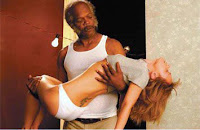
This is a movie that I want to love. It’s gritty, unique, and aware of class and race—a rare combination. However, there is no female perspective in the movie. Is it really too much to ask for a sharp film to also be sharp about gender? Is it right for a film like BSM to claim gender as a theme, while not really exploring women at all? Rae is the only female character (brief appearances by Lazarus’ wife, Rae’s mother, and a kind pharmacist easily fit into the angel/monster dichotomy), but she isn’t quite a real person. What is wrong with her? She is talked about as a nymphomaniac, and has strange, demonic fits of desire, but she’s really a victim of rape and abuse. Lazarus, whose trauma is that his wife aborted his baby and left for his younger brother, takes it upon himself to “cure” her by chaining her to a radiator. Even if the movie isn’t to be taken literally (but as a metaphor of sorts), why are the other characters so human and she so other, so animal?
Response by Stephanie
I, too, fell in love with the music in this film. It complements the key themes—race and class, as you mentioned, religion, and I’d also take it a step further to include sex. The scenes with Ricci shaking her ass for the camera are wonderfully sexy, and I found myself wavering back and forth during those scenes, wondering, is this just another female character being exploited by the camera? Or, is this a female character finally owning her sexuality?
Early on, she’s portrayed as a woman who’s at the mercy of her untamable sexual desires, and I didn’t ever get the feeling that she enjoyed them. She’s often shown squirming around on the ground, rubbing her hands all over her body, and moaning, like she’s struggling to fend off an attack. It’s at that point that she must find someone, anyone to screw, in order to make that feeling go away.
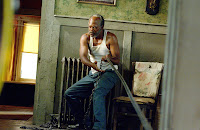
Later though, after Lazarus “cures” her by wrapping a giant chain around her waist and attaching it to a radiator, Rae is allowed to enter society again, showing up at a bar with Lazarus, drinking, rubbing up against everyone on the dance floor while Lazarus watches her from the stage, almost approvingly. What’s going on here? I truly want to read this as much more complicated than a man giving a woman permission to flaunt her sexuality, and I think it is.
But I also can’t help getting a little unnerved by the frivolity with which her sexuality is treated earlier in the film, when she’s portrayed as nothing more than the town whore. (At one point, the local mechanic says, “It’s already noon, Rae. Do you think those shorts should still be on?”) And when she’s described as “having the sickness” by another character (meaning nymphomania), it’s impossible not to think about the double-standard we still hold for men and women, especially when it comes to sexual desires.
As you mentioned, she is portrayed as “other,” often animalistic in her sexual conquests. Since I don’t think a film like this would work at all if a man were the one with the sexual “disease” (it’s natural for men to have uncontrollable sex drives, after all) then what does one make of using the myth of nymphomania to drive the plot? (See Peter Green’s “
All Sexed Up,” a review of Carol Groneman’s 2000 book
Nymphomania: A History, for a brief discussion of the myth.)
Response by Amber
I agree that the scene in the bar was very sexy, and I think I agree with what you said about that being a moment of Rae owning her sexuality. I think we’re supposed to understand that scene as a very important moment in which both characters are owning something that they’d lost—or lost control of. For whatever reason, Lazarus had lost his music (and I suspect it had to do with his wilting marriage), and Rae had lost control of her sexuality. However, that scene was exhilarating, and I think it has to do with reclamation and individual victory.
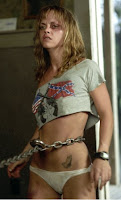
But back to the way gender and sex intersect. If nymphomania is itself largely fictitious, the strange way Rae’s fits were portrayed—moments in the film that were suspended between fear and comedy—reveals some of the ideological confusion of the film. If not for her nearly-naked body, battered and bruised and constantly displayed, I might have more sympathy for the film’s motivations. Add that to Rae’s moment of catharsis where she beats the shit out of her mother with a mop handle (for allowing Rae to be raped, either by her father or another male figure in her home), and we see women destroyed by sex who we’re supposed to sympathize with.
The final topic I want to bring up is religion. We can’t deny the role Christianity plays in the film. From the name of the main character to the supporting cast (which includes a preacher), the issue of faith (and a very certain brand of faith) comes up again and again. If the movie is a metaphor for “anxiety, fear, and unconditional love,” according to Brewer himself, then religion is the element that holds it all together. The instantiations of religion, however, are clunky at best; the radiator is God, the chain is faith, et cetera. I don’t really know where to go from here, except to acknowledge the large role of religion, although it plays out in hackneyed ways.
Response by Stephanie
While I would like to see both characters in this film actually achieve some level of reclamation and individual victory, I think it fails for the most part, but the film especially fails Rae. She remains “chained” in a metaphorical sense, even in the final scenes. I don’t believe her character discovers much, or achieves much of an arc; she remains, for me, completely static. In fact, the film pretty much uses her as a vehicle to showcase the success of Lazarus, (which is yet another example of female exploitation that Brewer has either no awareness of or no desire to address).
I was left feeling no hope for Rae in that final scene—she’s imprisoned, (in a stuffy car, surrounded by semi-trucks) stuck in a relationship with a man who’s essentially a child needing to be coddled, with only the memory of her radiator-chain to keep her from jumping from the vehicle and fucking her way across the interstate. But Lazarus has his music again. He’s managed to overcome his anger about his wife leaving him, and he’s even got a nice new chick to look after him. See how chaining up a white woman in Mississippi can revolutionize an entire worldview?
The truth is I never gave a shit about Rae. I could’ve cared for her, if Brewer hadn’t used her sexuality against her—it’s filmed as if the abuse she suffers is deserved. (See what you get when you go around whoring yourself? Tsk, tsk.) By the time we get to know her character, when, as you mentioned, she divulges her history of sexual abuse, then beats the shit out of her mother with a mop handle, it’s way too late for sympathy. By that point, Brewer has already managed to turn a young woman’s sexuality into a cross between sketch comedy and porn, where nothing about it feels real.
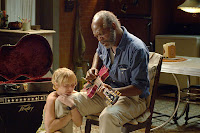
In that moment of catharsis with her mother, I found myself detached. Instead of sympathizing with Rae and coming to some kind of realization myself, I just rolled my eyes at the ridiculous, clichéd consequences of her abuse—girl gets raped by father-figure while mother does nothing to stop it, girl develops low self-esteem, girl becomes town slut, girl develops a fictional sex disease, girl gets chained to radiator by religious black man. Wait, what? Ah religion, how you never cease to reinforce the second-class citizenship of women, perpetually punishing them for their godless desire to fuck.
So Rae is possessed by an evil sex demon, and, at one freaky moment, Lazarus’s ex-wife. Lazarus and his brother are Cain and Abel. There’s adultery, lust, preachers, fire-and-brimstone, bible passages, and judgmental townsfolk. Basically, the religious themes receive the same clichéd treatment as women’s sexuality. Rae is pretty much “saved” by Lazarus, and Lazarus pretty much gets his shit together and “rises from the dead” (as Lazarus in the bible).
And, after this conversation, I’m starting to wonder if I’m the problem, if I made the mistake of taking this film seriously, when what it really wants to be is one big sensationalist metaphor. A metaphor for what, though? I’ll conclude with something Brewer says in an interview.
I’m not writing from a place of progress. I’m not writing a movie that I want people to necessarily intellectualize. And I think that really messes with people who feel that they need to make a statement against this, and they don’t quite know what it is they’re against. Because man alive, you look at this imagery on this poster, and I’m so obviously banging this drum. It’s like, you really believe that I believe this? That women need to be chained up? Can we not think metaphorically once race and gender are introduced?
Read the
Salon.com interview with Craig Brewer
